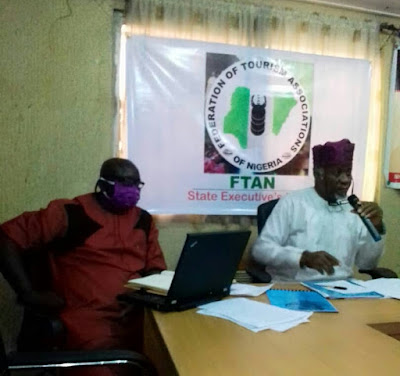Despite the early morning traffic in the heart of Lagos as Lagosians brace up to the closure of the Third Mainland Bridge, the FTAN Lagos state chapter members arrived early to the executive inauguration and thisday will forever be a memorable day in the history of Federation of Tourism Association of Nigeria, Lagos State Chapter.
The executive inauguration meeting was anchored by the FTAN SOUTH WEST, VICE PRESIDENT, Chief Otunba Ayo Olumoko, who encouraged every executive members to be dedicated, hopeful and put their ideas into action for the transformation of the tourism industry in Lagos State and Nigeria. Chief Otunba Olumoko noted that tourism organizations and practitioners in Lagos and Nigeria should continue to be friendly with government agencies. He continued that as every tourism entrepreneurs seek government actions in creating an enabling environment for tourism activities to improve and also seek policy makers attention, it is imminent for tourism professionals to continue to be friendly, even though they've always been friendly and he furher encouraged tourism enterpreneurs to imbibe integrity in the promotion of collaboration and partnership with private investors.
FTAN certificate of Incorporation was presented to the State Cordinator, Alhaji Gbenga D. Sumonu, who during his inauguration speech, implored stakeholders and associations to study the Nigeria Tourism Master Plan, assess it, come up with a plan, or suggestions and arrive at a juncture where the interest of the industry will supersede self interests.
The new executive council members are Otunba Ayo Olumoko FITPN (Vice President
South West Zone), Alhaji Gbenga D. Sumonu (Lagos State Coordinator), Mrs Ope Wemi-Jones, Prince Anago James Akeem Osho, Mr Ayo Omotosho, Mrs Ugo Obiayo, and Mr Victor Bamigbade.
As local tourism advocacy is on the lips of every stakeholder, and international tourism is anticipated in earnest, Nigerian tourism enterpreneurs expect the development of tourism in totality as they indulge the support of Lagos state government ministry of Tourism, Art and Culture.



